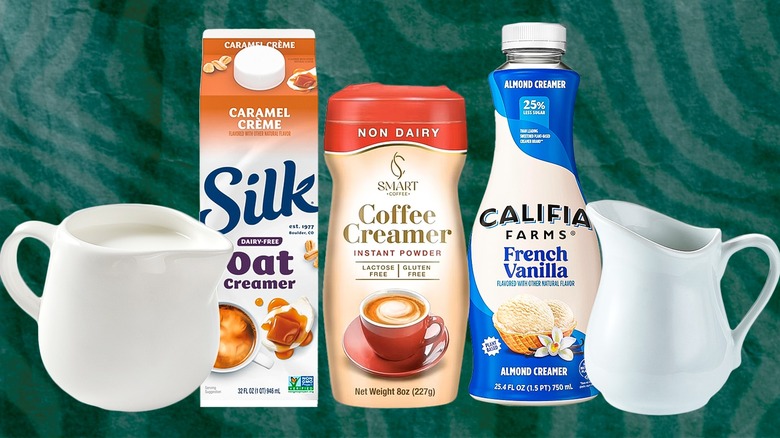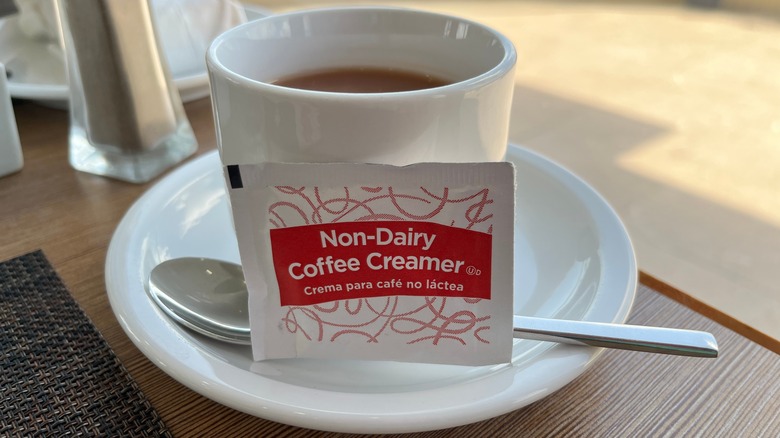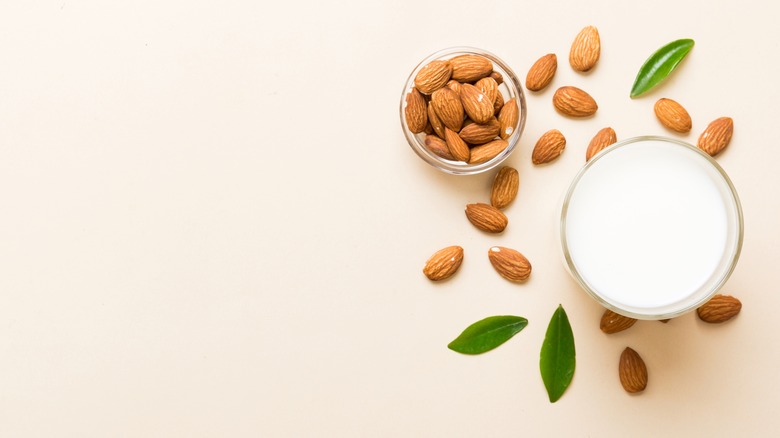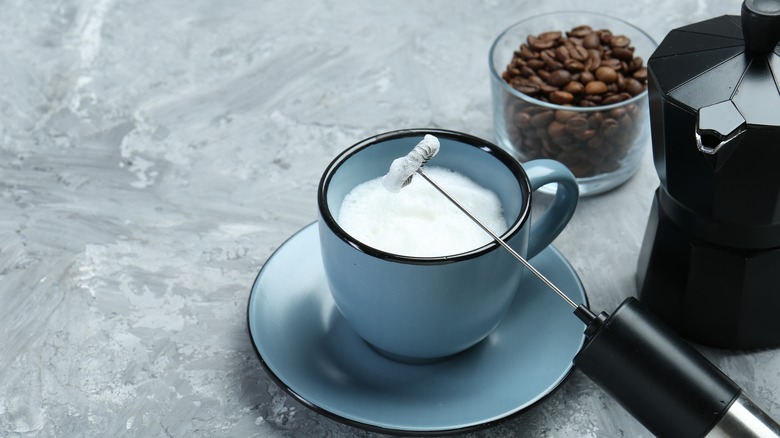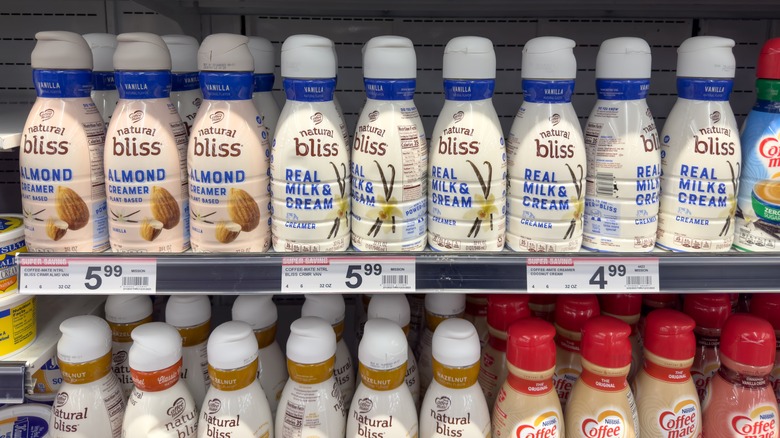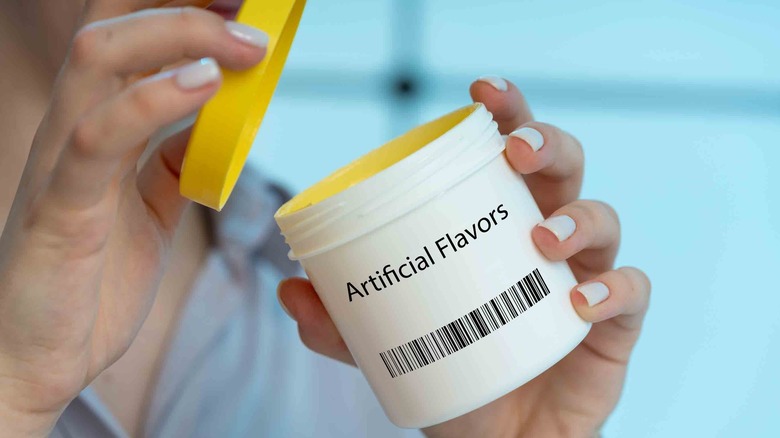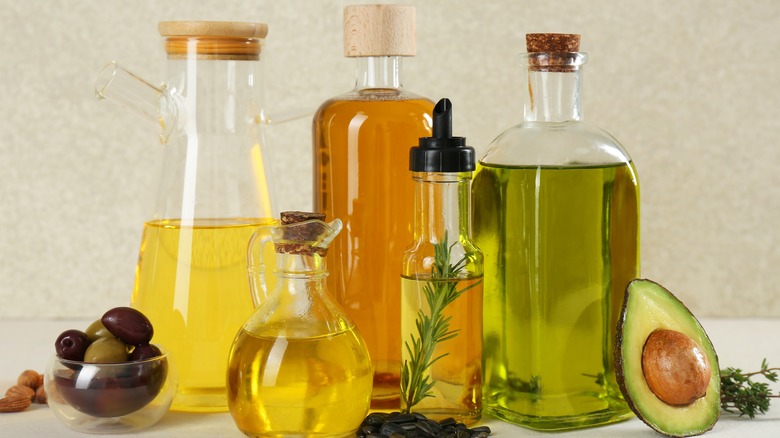8 Expert Tips For Choosing The Right Dairy-Free Coffee Creamer
For many people in America, a cup of coffee is a morning ritual that can't be skipped. In fact, according to the National Coffee Association, coffee consumption in the U.S. is the highest it's been in over 20 years. But with the rise of food intolerances, veganism, and other health concerns, many people are opting to forgo their splash of cream in favor of a dairy-free option. But choosing a dairy-free coffee creamer isn't as simple as it may seem. From differing consistencies to whether or not your dairy-free creamer is actually vegan, there's a lot more than meets the eye.
After spending a handful of years as a barista and as someone who personally uses dairy-free creamers, I know firsthand what constitutes a great-tasting dairy-free creamer. My background in natural health also taught me that not every brand is created equal. Between deciphering food labels and learning what factors make certain brands different from the rest, there are a handful of things you should consider when choosing a dairy-free coffee creamer to ensure you get one that aligns with all of your personal preferences.
1. Consider if it's really vegan
If you are opting for a dairy-free creamer because you want to stay away from animal products, it's important to know that your non-dairy coffee creamer may not actually be vegan. Even without cow's milk being included as the main ingredient, many dairy-free creamers still use a number of ingredients derived from animals. Some of these include casein and whey, two proteins found in milk, and lecithin, a type of fat found in eggs. Lecithin can also be derived from soy, but thankfully it is typically denoted as soy lecithin on the label to avoid any further confusion.
Since the FDA unfortunately doesn't have standards around the term dairy-free, it's up to brands to determine just how far they take that with the rest of their ingredients — and as a result, how much work you as a consumer will have to do to wade through ingredient labels. So whether you are staying away from animal products for ethical, dietary, or environmental reasons, your safest bet is to make sure your creamer is labeled "vegan" directly on the package.
2. Watch out for nut allergies
Since dairy-free coffee creamers rely heavily on nuts as the base ingredient for their consistency, flavor, and nutritional value, you have to keep a careful eye on what ingredients are used if you have a nut allergy. Cashews and almonds are the most commonly used nuts for dairy-free creamer, but hazelnuts, pistachios, and walnuts are also rising in popularity.
But here's the catch: Nut "flavored" dairy-free creamers may still be okay for those with nut allergies. While it seems contradictory, a lot of brands don't actually use nuts to flavor the creamer. Take a hazelnut-flavored creamer for example. A brand may use a mixture of oils, water, and other ingredients as the base but use "natural flavors" — derived from who knows what — to obtain the hazelnut flavor you know and love.
You might not be able to know this at first glance or even when reading the label at the store, but most of the time brands will have common allergens listed for products on their website, giving you further insight into whether or not a flavor comes from a real nut or an artificial source. It should also tell you if the dairy-free creamer you want to purchase is made on-site alongside other products made with nuts, increasing the risk of cross-contamination. Thankfully there are plenty of other options out there if you can't have nuts, including coconut-based creamers and plenty of oat milk creamer brands.
3. Sweeteners make a difference
Similar to traditional coffee creamers, dairy-free creamers use a variety of sweeteners, some natural and some artificial or sugar-free. Zero-calorie sweeteners — including natural sources like stevia, monk fruit, and xylitol along with artificial sweeteners like aspartame — can be a great choice depending on your particular dietary needs. But interestingly enough, some brands use a handful of different sweeteners in the same creamer — both zero-calorie and traditional — making reading labels a vital thing when choosing a dairy-free creamer.
Vegans should also watch out for certain sweeteners. Surprisingly, sugar is not always vegan as refined white sugar uses bone char — the charred bones of cows and other livestock — as a bleaching agent. So if you are a staunch vegan, you'll want to look out for the use of this to play it safe. Beet sugar and organic unrefined cane sugar typically don't use bone char though, so if your dairy-free coffee creamer uses one of these you're likely in the clear. And while it's a less-common ingredient in commercially sold dairy-free creamers, honey is also not considered vegan since it is made from honeybees.
4. Creamer consistency is key
A big reason why dairy is loved by so many is because of its creamy consistency that gives every cup that deliciously smooth sip. For the most part, many of the main ingredients common in dairy-free creamers lack this type of consistency, leaving brands to rely on added ingredients like gums, emulsifiers, and oils to replicate both thickness and creaminess. On the surface, these ingredients seem relatively harmless, but over the years people have begun to question just how healthy these ingredients are when consumed on a daily, long-term basis as they have been linked to gut problems, inflammation, and increased cancer risk.
If this is an issue for you, various health-food brands have responded to these concerns by creating dairy-free creamers using minimal added ingredients. But by using just what is necessary and nothing more, these dairy-free creamers can tend to be on the watery side. Not only do these types of creamers lack thickness, but they don't always froth well. Dairy-free creamers can require a lot more shaking and stirring since they don't have the binders required to keep the ingredients from separating in the container and your coffee cup.
5. Consider shelf stability
When walking through the aisles of your local grocery store, you're likely to see dairy-free creamers in the refrigerated section as well as sitting on a shelf. This can create a lot of confusion surrounding how best to store your coffee creamer and if it's necessary to keep it cold 24/7 to make sure it doesn't spoil. For most of these dairy-free creamers, you'll still need to store them in the refrigerator after opening. The ingredients are prone to bacteria growth once the seal has been broken and the creamer is exposed to air. Just remember to be conscious of exactly how long your creamer lasts after opening so you aren't surprised one day after taking a sip of your coffee.
The benefit of dairy-free creamers is that the likelihood of them coming in smaller or single-serve containers is a lot higher. These are perfect for throwing in your bag when on the go, or taking with you on a trip where you aren't going to have access to a refrigerator or giant cooler. You can even find a handful of brands that have powdered versions that are shelf-stable after being opened.
6. Watch out for artificial ingredients
Some food dyes, sweeteners, and flavors are derived from natural sources while others come from artificial sources. Certain brands are more clear than others regarding where their sources come from (because FDA regulations surrounding the requirements and transparency to consumers on this terminology can be slightly ambiguous). Due to this ambiguity, there can be some confusion about what ingredients are being used to achieve the flavor of your creamer. Ultimately, this is up to your preference, but you'll still need to look at the label to know what ingredients they use.
The good news is that if you prefer truly natural ingredients, health-food brands typically denote whether an ingredient is organic or if it uses natural ingredients (like spices) for both coloring and flavor. A good example is turmeric. Both powdered and fresh turmeric have many uses, with one of the most popular being to add color to certain foods. Pumpkin spice — a flavor synonymous with its yellow-orange hue similar to turmeric — is a perfect example.
7. Added oils can impact fat content
One of the most common ways brands mimic the consistency of dairy in dairy-free creamers is through the use of oils. Conventional brands often use oils like soybean oil, which are considered polyunsaturated fats, whereas health food brands tend to use coconut oil, a type of saturated fat. Each type has its pros and cons (and some brands don't use oils at all), so you'll want to comb through the label to determine if this is something you are ok with having.
A big issue with added oils is the fat content and the role that can play in your dietary needs. Factors like cholesterol management, athletic performance, and weight loss or maintenance can be affected by just how much fat you do or don't have on a daily basis. These things aren't deal-breakers for everyone, but something to be aware of as you factor in what is important to you personally (and what's not) when buying a dairy-free creamer.
8. Some brands offer special additions
If you are someone who wants to make the most out of everything you eat, some brands specialize in making dairy-free creamers with added healthy ingredients. Known as "functional" or "superfood" coffee creamers, these are designed to boost the nutritional value of your daily cup of coffee with ingredients that target different areas of your health. For instance, collagen can amplify the protein content of your creamer whereas adaptogenic herbs and mushrooms (like ashwagandha and lion's mane) have been linked to reduced stress and enhanced cognitive function.
Like a lot of other ingredients on this list, you still have to consider whether or not these additions are vegan-friendly if that happens to be the main reason you are choosing a dairy-free coffee creamer. But if this isn't a problem for you, these ingredients can be beneficial for adding thickness to your creamer, eliminating the need for excess gums, emulsifiers, and binders. Plus, more often than other kinds of dairy-free creamers, these functional dairy-free creamers come in powdered form making them shelf-stable and incredibly portable. Laird Superfood Coffee Creamers are one of the market's most popular creamers in this category, boasting an impressive lineup of powdered creamers that include adaptogenic and turmeric-boosted varieties.
